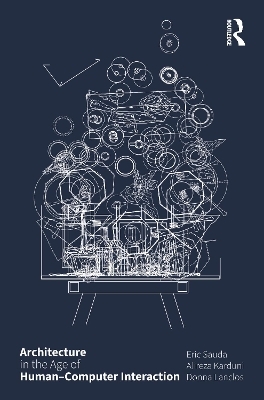
Architecture in the Age of Human–Computer Interaction
Routledge (Verlag)
978-1-032-42592-4 (ISBN)
This book investigates the spaces where architecture and computer science share a common set of assumptions and goals, using methods and objectives from architecture, ethnography, and human–computer interaction (HCI).
Architecture and HCI depend on and borrow from each other, and even share some vocabulary in their divergent disciplinary agendas. The authors here unpack the past, present, and potential futures of architecture and the user interface, employing the lens of ethnography and ethnographic practices to launch this exciting cross-disciplinary inquiry. The goal is the creation of an interface that is able to connect the wide range of embodied architectural space, the modes of interaction afforded by computation, and the social process of creating meaningful places.
This will be of great interest to upper-level students and academics in the fields of architecture, human–computer interaction, and ethnography.
Eric Sauda is a registered architect and Professor of Architecture at University of North Carolina at Charlotte (UNC Charlotte), United States of America. He specializes in the use of digital and computational technologies and their transformative effect on architecture. Alireza Karduni is Assistant Professor of Human-Centered Computing at Simon Fraser University, School of Interactive Arts and Technology, Canada. His research lies at the intersection of human–computer interaction, data visualization, and thinking with data. Donna Lanclos is an anthropologist and Senior Research Fellow in the Technology Enhanced Learning department at Munster Technological University, Ireland.
1. Introduction 2. Architecture: Theory and Practice 3. Human–Computer Interaction: Methods and Theory 4. Meaning: Interpretation and Ethnography 5. Affordance: Ecological and Social 6. Movement and Position 7. Information: Mobile, Proxemic, and Augmented Reality 8. Interaction: Digital Installations 9. Conclusion: Architectural User Interface
| Erscheint lt. Verlag | 8.11.2024 |
|---|---|
| Zusatzinfo | 6 Line drawings, black and white; 35 Halftones, black and white; 41 Illustrations, black and white |
| Verlagsort | London |
| Sprache | englisch |
| Maße | 152 x 229 mm |
| Gewicht | 320 g |
| Themenwelt | Informatik ► Software Entwicklung ► User Interfaces (HCI) |
| Naturwissenschaften ► Biologie ► Ökologie / Naturschutz | |
| Naturwissenschaften ► Geowissenschaften ► Geografie / Kartografie | |
| Sozialwissenschaften ► Ethnologie | |
| Sozialwissenschaften ► Soziologie | |
| Technik ► Architektur | |
| ISBN-10 | 1-032-42592-X / 103242592X |
| ISBN-13 | 978-1-032-42592-4 / 9781032425924 |
| Zustand | Neuware |
| Haben Sie eine Frage zum Produkt? |
aus dem Bereich


